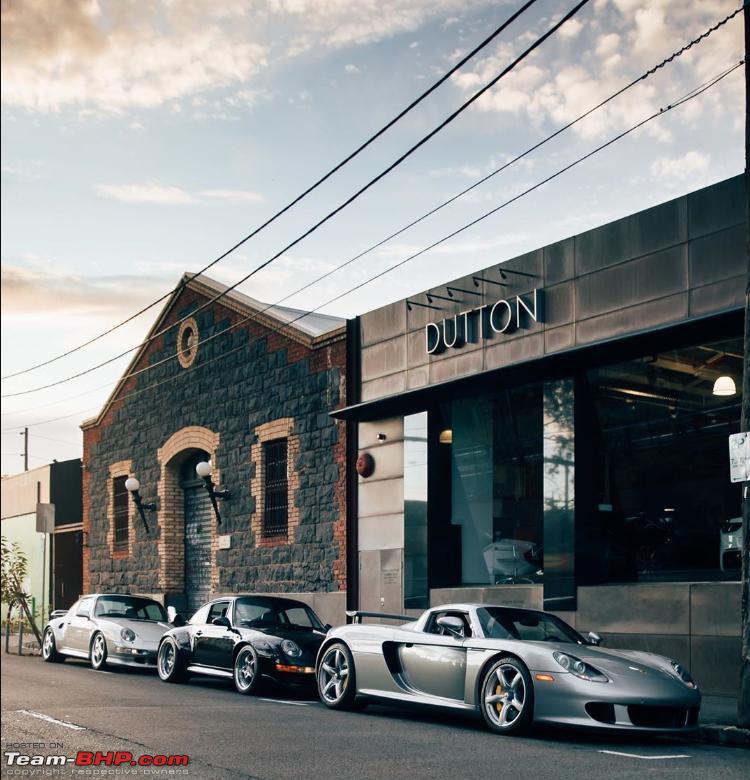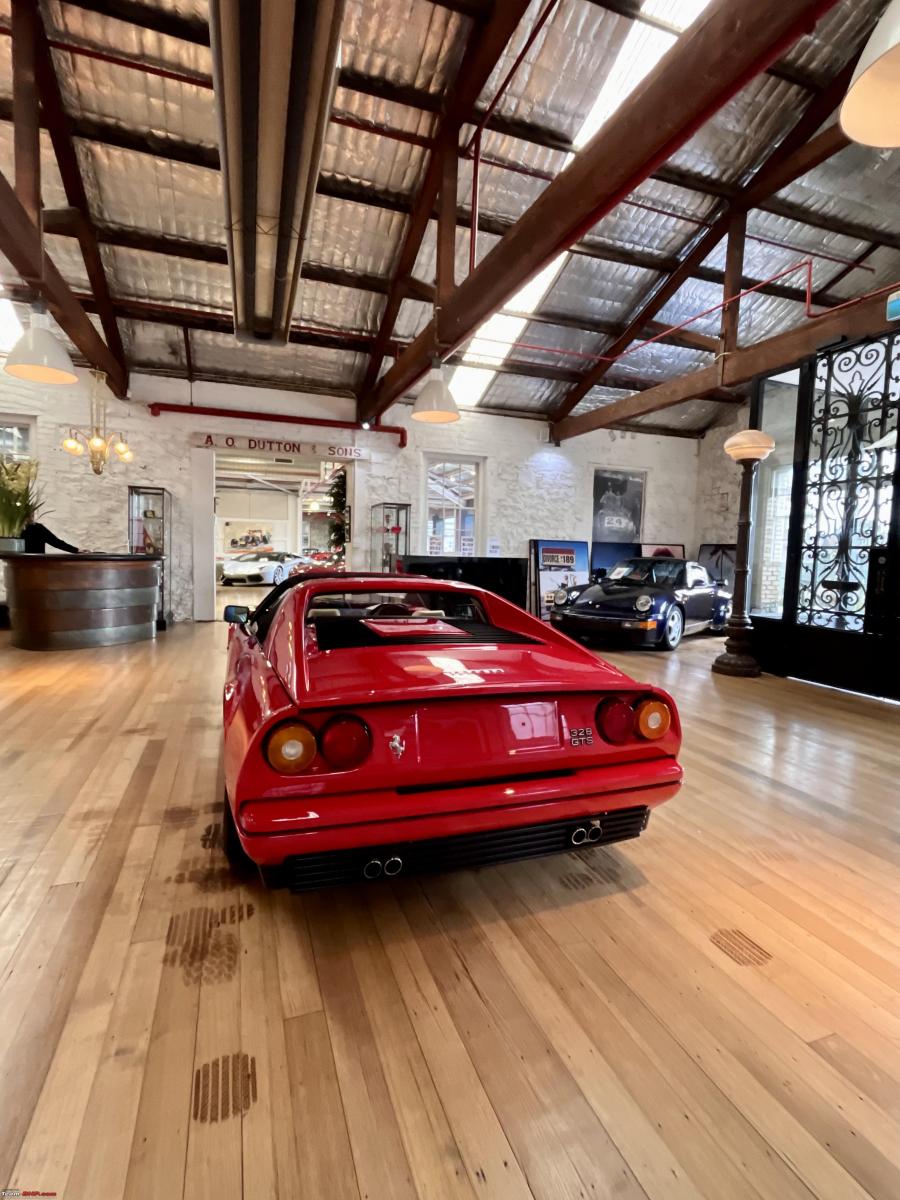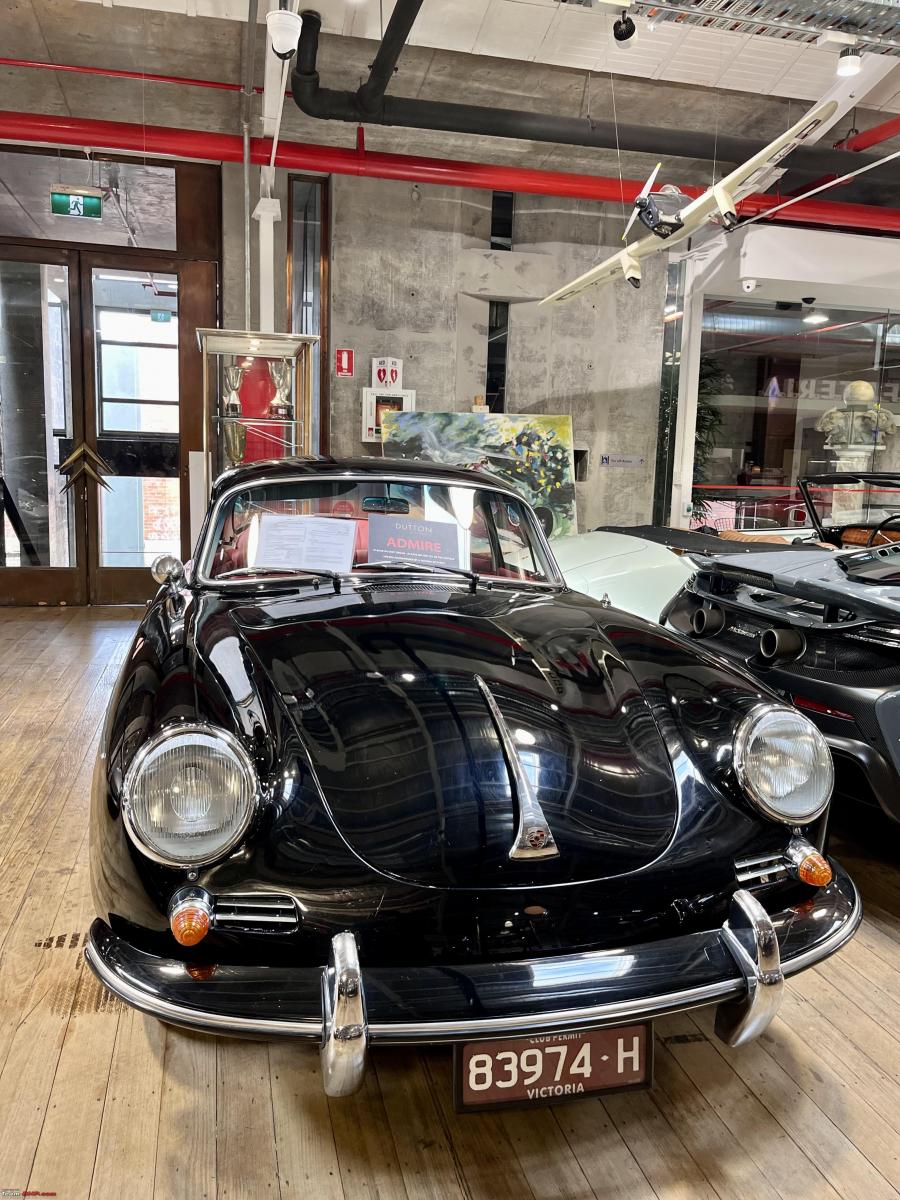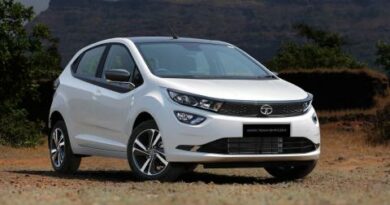Witnessed many classic, exotic & rare cars at Dutton Garage, Melbourne
As soon as we entered by pushing the vault-like doors at the entrance we were welcomed by 5 Porsche 911s and a Ferrari taking centre stage.
BHPian CEF_Beasts recently shared this with other enthusiasts.
The sole purpose of this trip from Mumbai to Melbourne was to drop my sister off for her MS and a visit to the prestigious Dutton Garage wasn’t even on my list.
Me being the car enthusiast in the family, the other members (my mother and sister, my father couldn’t come due to work commitments) are not car persons and if I even stopped for 2 minutes on the road to click some pictures of a nice car I would be termed as a ‘Time-waster’, so spending 2 hours in Dutton Garage ogling at the variety of cars with my sister and mother was an accomplishment in my books!
I didn’t know there was something called ‘Dutton Garage’ while I was there, it was a random search on the internet that led me here. On our last day (Wednesday 26/07) we had kept the day as a rest day since the next morning we had to catch our flight back to Mumbai. I was searching for something car-related that I could do on this day, came across the ‘Fox Classic Car Collection’ in Docklands, Melbourne and decided to call them to ask about tickets. But later found out that it was open only two days a week namely, Thursday and Saturday being a private collector’s collection. With us leaving on Thursday this was a bummer for me, and then luckily read about the Dutton Garage, a premium retailer of Classics, Exotic and Rare Cars, in Richmond, Melbourne.
Took the 1:05PM train from Flagstaff Garden Train station to Burnley, which reached in 12 mins, Dutton Garage was a 2 min walk from the train station.
The Entrance of the Dutton Garage (picture taken from their website, I forgot to take a picture from outside the showroom)
Some details of Dutton Garage from their website:
Dutton Garage is a subsidiary of the Dutton Group. The Dutton Group is owned by its founders, Gavin Fernandez and George Nakas, alongside CPE Capital (formerly CHAMP Private Equity).
CPE Capital and its affiliated fund entities have deployed approximately A$3.8 billion of investor commitments since 1987. CPE Capital has one of the largest dedicated buyout teams in the region and is Australasia’s most experienced private capital manager, having made 75 platform investments during its 32 year history. CPE Capital undertakes control buyout transactions, enters into founder partnerships and provides growth investments for mid-market companies in Australasia, including those which possess significant offshore operations or ambitions.
Funds managed by CPE Capital acquired an interest in Dutton in early 2017, and since then CPE Capital has successfully partnered with the founders and management to grow the business both domestically and internationally.
Adding to this, Dutton Sporting Cars has a lineage that brings over a hundred years of classic car expertise. First established in 1911 by Albert Octavius Dutton – the Dutton brand has a legacy of auto racing in Australia that is beyond compare.
The Dutton family known as the ‘the first family of automotive style’ are renowned for their unique presentation of retail buildings and showrooms. They have created exquisite homes for exotics, automobiles, automobile and motorsport art. Their interior design of this amazing building has taken them to even another level.
Jeff, Gay and James have sourced and installed design features to further enhance the Karl Fender creation with a museum likes exhibition providing a welcoming meeting place to peruse in comfort. A fusion of culinary and automotive passion can be discovered within the showroom.
A Cafe within a retail showroom was introduced by the Dutton family in 1991 and set the pace throughout Australia.\
JEFF DUTTON
(SENIOR CLASSIC CAR SPECIALIST)
As the third generation Dutton, Jeff began his career in the family workshop as a mechanical apprentice where he honed his skills in repairing Porsches and Ferraris. During his tenure in the family workshop Jeff saw the opportunity to begin buying the exotic cars he was repairing and began forming his talents in buying, selling and advising on rare and collectible cars.
Over a career that spans over five decades, Jeff has been humbled to have the rare opportunity to be involved in the purchase of some of the most important car collections in the world. He is considered a doyen amongst motoring enthusiasts and is, without a doubt, one of the most prolific classic car experts.
Let’s get started with the Classic and Modern Cars, I was lucky enough to see from up close…
PS: Some car pictures in the following posts have been taken from their website where it wasn’t possible for me to take a picture due to the number of cars / space constraints / I missed them due to my sheer excitement.
THE CLASSIC CARS
As soon as we entered by pushing the vault-like doors at the entrance we were welcomed by 5 Porsche 911s and a Ferrari taking centre stage.
1989 Ferrari 328 GTS Coupe
The Ferrari 328 GTB and GTS served as the successors to the Ferrari 308 GTB and GTS, while retaining much of their design. However, slight modifications were made to both the body style and engine. Notably, the engine displacement was increased to 3.2 litres. Equipped with a 3.2-litre V8 engine boasting 4-valves-per-cylinder (quattro valve) technology, this Ferrari delivered an impressive 275 horsepower to the rear wheels through a 5-speed manual transmission. Consequently, it could sprint from 0 to 100 km/h in just 5.5 seconds and achieve a top speed exceeding 260 km/h.
Among Ferrari enthusiasts, the 328 is often regarded as one of the most reliable models. Unlike some other Ferraris, most engine maintenance tasks can be completed without removing the engine from the vehicle. The production numbers reflect its popularity, with a total of 6,068 GTS (convertible) models produced, significantly outnumbering the 1,344 units of the GTB (coupe) variant.
1992 Porsche 911 964 Turbo Coupe
This 1992 Porsche 911 964 Turbo is finished in Midnight Blue paintwork with black leather interior and has travelled 35,162kms. It has a 3.3L turbo engine mated to a 5-speed manual transmission.
1993 Porsche 911 964 Turbo Coupe
The Porsche 911 Turbo 3.6 of the 964-generation drips with appeal, not only for rarity, but its fame that was amplified by its appearance in the 1995 film “Bad Boys,”. In right-hand-drive configuration where only 159 were made, it is the poster 911 Turbo. The registration plate is a testimony.
Replacing the iconic 930 Turbo was no easy task for Porsche, and the initial release of the Type 964 Turbo faced challenges in production, budget, and time constraints. It came with a 3.3-litre engine from its predecessor, which disappointed enthusiasts with its underwhelming performance—315 HP.
Porsche answered the disappointment by introducing the 3.6-litre Turbo in 1993. It featured a new flat-six M64 engine based on the one found in the 911 Carrera 4, producing 360 HP. This upgraded model also boasted a lower suspension, a stronger front anti-roll bar, and big red brakes.
This 1993 Porsche 911 964 Turbo 3.6 is finished in Satin Black Metallic with black leather trim. The 18-inch three-piece Speedline Alloys with exposed alloy bolt heads, and the mirror-like paintwork perfectly complements the Turbo 3.6’s sinful nature.
From Left to Right: ’94 911 993 GT2, ’98 911 993 Turbo S & ’76 911 Carrera Coupe Resto-Mod
1994 Porsche 911 993 GT2
This 993 GT2 is presented as one of the rarest Porsches to roll off the production line. Of the 57 made, only 7 were right hand drive.
Featuring a Turbo air-cooled 3.6 litre flat six that puts out a phenomenal 430bhp at the rear wheels, coupled with a set of oversized bolt on guards, aggressive aero features and the infamous whale tail with added air scoops, this 993 GT2 is a true Porsche enthusiast’s dream.
The car itself was developed as a reaction to the regulations of the FIA GT2 racing class. During the mid-90s, the racing body had placed severe limitations, if not outright bans, on the use of all wheel drive cars, leading to Porsche developing a rear wheel drive variant. Removing the all drive train resulted in significant weight losses to the car, bolstering performance.
In order to meet FIA homologation requirements, Porsche created a limited number of street legal variants, and one of those cars is here.
1998 Porsche 911 993 Turbo S
This example is finished in Jet Black paintwork with a black leather interior. This example has travelled 86,795kms.
The Porsche 993 is highly revered among enthusiasts as the ultimate 911. It holds the distinction of being the last air-cooled 911 and the final hand-built model before Porsche refined its production methods.
In 1997, Porsche introduced a limited factory-production series known as the 993 Turbo S, marking the culmination of the air-cooled 911 Turbo lineage. The Turbo S models were equipped with an array of Turbo options as standard, including the distinctive Aerokit II front and rear spoilers, unique side air ducts and front air inlets, eye-catching yellow brake calipers, and dual exhausts with Quad round tips.
These exceptional vehicles were exclusively crafted by Porsche’s Exclusive Department and carried a price tag 50% higher than the regular 993 Turbo. Just 345 units were ever produced worldwide, with 26 of them built in right-hand drive configuration and a mere 15 finding their way to Australian shores.
1976 Porsche 911 Carrera Coupe Resto-Mod
The Carrera nameplate has a storied history, closely linked to the challenging Carrera Panamericana Road Race – a legendary event that forged motorsport legends for both manufacturers and drivers.
Today, the Carrera name graces generations of Porsches, spanning from the early 356 to the current lineup. Among its iconic models, the 911 Carrera 3.0 holds a special place in history, combining two Porsche legends into one remarkable car that enjoyed a production run of less than 12 months.
Succeeding the highly sought-after 2.7 Carrera, the 911 Carrera 3.0 merged racing technology with the mighty 3.0-litre aluminum engine found in its legendary stablemate, the Type 930 911 Turbo. This creation marked the pinnacle of the 911 lineup in the 1970s, an era where Porsche dominated world motorsport events.
The AllSport Carrera 3.0’s RestoMod, resplendent in period-correct Porsche Continental Orange and having covered only 84 kms since restoration. This car bears the production number 807 out of a limited series of 3,687 Carreras ever manufactured, retaining its original left-hand drive configuration.
AllSport boasts expertise as a specialist parts supplier for classic Porsches, particularly early 911s. This vehicle features a fully rebuilt 3.0 Litre Porsche engine, with power enhanced from 200HP to over 250HP, connected to a rebuilt 915 5-speed gearbox.
Moving over to the next room, which looked like a newer building, had the Cafe, offices, many more cars and a test-drive bay on the side. The first classic car seen as soon as we entered this part of the building was the ’67 Mustang GT500.
1967 Ford Mustang GT500 ‘Eleanor’ Fastback
After first appearing in the 2000 remake of the movie ‘Gone in Sixty Seconds’, The Shelby Mustang GT500 ‘Eleanor’ has become an icon among car enthusiasts. The origins of ‘Eleanor’ can be traced back to the 1967 Shelby Mustang GT500, first designed by Carroll Shelby himself.
Fitted with a number of custom features, including a nitrous oxide system, a roll cage, modern dash and a custom body. This 1967 Ford Mustang Fastback has been transformed to become a truly outstanding tribute and turn key example of that hero car from the Hollywood blockbuster.
The exterior presents itself with the correct Pepper Grey metallic paint complemented by black metallic stripes. The brightwork is in wonderful condition with the trims, bumpers, and badges sitting flush on the straight and smooth bodywork. Its body kit is a faithful recreation, with the Shelby-style front bumper, deep side skirts, side exit exhausts, power bulge bonnet, and the twin spot lamps in the lower grille. Riding on a set of correct 17-inch ‘Eleanor’ wheels, housing disc brakes front and rear. The whole body is now sitting on Koni Adjustable Shocks.
1993 Ferrari 348 Spider
In late 1993, the 348 was revised, featuring subtle styling changes (front grille, rear chrome Cavallino and removable seat cushions) and more power, this time 312 hp and 316 hp (for Europe) from the same 3.4-litre engine, with an improved version of the Bosch Motronic 2.7 Engine Management System and a new exhaust system (single muffler).
The revised cars are called 348 GTB (252 made) and GTS (137 made) and were presented to the public as the 348 GT versions, equipped with the F119H engine (as opposed to the original F119D and US F119G). The F119H engine had an increased 10.8:1 compression ratio as compared to the F119D & F119G’s 10.4:1 compression ratio, taller intake plenums, a larger intake compensation valve, fuel pressure raised from 3.4 bar to 3.8 bar, and different camshaft timing. The fuel tank was made smaller in order to reduce overall weight and provide space to improve chassis rigidity; it now held 88 L.
This convertible variant called the Spider was introduced in 1993 and was Ferrari’s first series production convertible model since the Daytona Spider. Visual changes for the Spider included body coloured lower cladding pieces, a specially designed engine cover and a manual folding soft top. The rear track was increased by 50 mm compared to the 348TB. The Spider used the same engine as the 348 GT models and hence benefitted from the increased power output. A new transverse mounted gearbox with modified gear ratios was installed to ensure better acceleration times and shift response.
1964 Porsche 356SC Coupe
With its lightweight construction, rear-engine layout, and precise German engineering, the 356 provided the genetic foundation for the iconic Porsche 911 that we recognize today.
The Porsche 356 SC was the ultimate performance variant of the 356 C Generation, boasting the most potent pushrod 4-cylinder engine ever available from Porsche, with a staggering 95 HP. This represented a 15% power increase over the standard 356 C engine, thanks to a reinforced counter-weighted crankshaft, short-skirt pistons, a more aggressive camshaft configuration, and larger Solex carburetors.
The SC was primarily available as a Coupe, but a Cabriolet variant was also offered. It succeeded the Super 90 from the previous generation, serving as the flagship model for the final evolution of the Porsche 356. The SC engine was later slightly revised and used as the powerplant for the entry-level variant of the Porsche 911, the Porsche 912.
This Australian Delivered, Porsche 356 SC was delivered new to Sydney in 1964. Documented to be one of only six Porsche 356 SC delivered to Australia and one of four delivered in 1964, this ultra-rare car on Australian soil has only had two owners in the last 50 years. The last of whom was a major 356 collector in Melbourne.
With matching numbers, confirmed by Porsche Australia, the car is in preserved condition. The black paintwork shows a lovely patina with the recently retrimmed interior by expert Tim Ward, in a deep red factory Porsche vinyl a handsome contrast.
1995 Ferrari F512M Coupe
The Testarossa, with its striking wedge shape and powerful flat-12 engine, epitomized the essence of a Ferrari during its era. Produced for an impressive 12-year span from 1984 to 1996, it gained significant popularity through its appearances in TV shows like Miami Vice and Sega video games. Designed by Pininfarina, this iconic sports car from Maranello became one of the most influential and successful models ever built.
Today, the Ferrari Testarossa has evolved into a highly sought-after collectable. While purist collectors favor the early ‘Monospecchio’ models for their untouched, original design, more ambitious drivers lean towards the 512 TR, which made its debut in 1991. However, the fastest, rarest, and most coveted version of the flat-12 legacy is the F512 M.
The F512 M marked the ultimate iteration of the Testarossa, boasting a 4.9-litre flat-12 engine positioned longitudinally in the middle of the car. With a maximum power output of 328 kW at 6,750 rpm, this engine delivered exceptional performance mated to a 5 speed manual gearbox. Only 501 vehicles were produced, including a limited run of 75 right-hand drive models.
The front end features a 456-style Ferrari-family grille, evoking a wide smile highlighted by the reshaped bumper and air dam. The unique 18-inch split-rim Speedline wheels, adorned with 35 alloy bolt heads and elegantly sculpted spokes, not only enhance the aesthetics but also aid in brake cooling.
1958 Mercedes-Benz 190SL R121 Roadster
The 1955 launch of the 190SL, cemented Mercedes Benz’s reputation as the car manufacturer for those who wanted elegance, build quality and a good turn of speed. Its hugely successful production ran to 25,881 cars from 1955 until 1963, mainly in left-hand drive form, with most going to the North American market. Understandably few were made in right-hand drive and according to records, the total number of cars consigned for the British market is understood to be 562.
The 190 SL was conceived as a lifestyle-oriented counterpart to the striking 300SL Gullwing, thanks to the visionary Max Hoffman, a prominent luxury European car importer and Mercedes-Benz representative in the USA.
Powered by the M121 1.9-litre Inline Four-Cylinder engine, boasting the same bore and stroke as the original six-cylinder powerplant from the 300 SL, albeit with two fewer cylinders. Equipped with twin Solex downdraft carburettors, it produces 110 horsepower, propelling the little roadster from 0 to 100 km/h in 13 seconds.
The M121 engine is paired with a fully synchronized 4-speed transmission, sending power to the rear swing axles and utilizing the same suspension systems found in the 300 SL. These components contribute to confident handling and drivability.
1954 Porsche 356 Super
This is the 4th Porsche delivered to Australia and the first car delivered under the Norman Hamilton & Co entity. The car was ordered new by Bill Wylie of the famous Wylie Munroe Shock Absorber Co.
The car held the Australian land speed record for cars under 2000cc set at Lake Eyre in 1956. The car was totally restored in the late 90s by Murray McLeod, including fitting a new old stock genuine 1500 Super roller bearing crankshaft.
Continue reading about CEF_Beasts’ experience for BHPian comments, insights and more information.
Source: Read Full Article
































